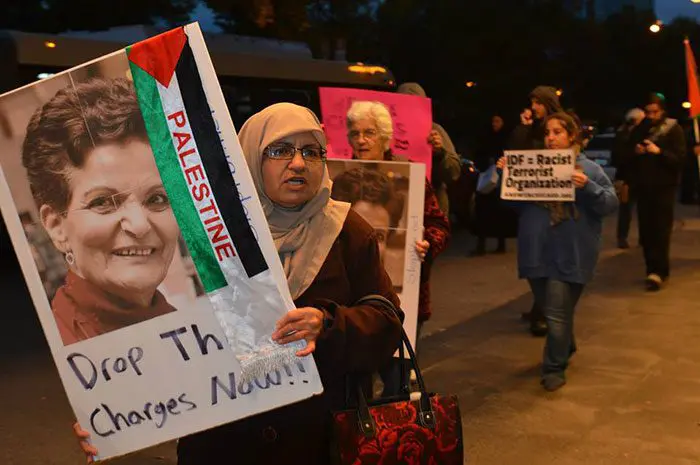
DETROIT — The judge in Rasmea Odeh’s case is expected to soon make a decision on a defense motion requesting the reinstatement of her bond.
Last month, Odeh, 67, a Palestinian American activist living in Chicago, was found guilty of lying on her U.S. naturalization application about having been arrested and convicted in Israel 45 years ago. In 1969, Odeh was convicted of participating in a bombing in Israel. However, she says her conviction in Israel was based on a forced confession obtained by torture.
On Nov. 10, hours after the verdict, U.S. District Judge Gershwin A. Drain declared Odeh a flight risk and revoked her bond. She was arrested immediately. She will be sentenced on March 10.
The defense attorneys filed a motion demanding Odeh’s release, highlighting her ties to the community. The motion included a statement from a psychological expert who said prison activates the symptoms Odeh’s Post Traumatic Stress Disorder.
Odeh says she was tortured in Israel and clinical psychologist Dr. Mary Fabri, who was not allowed to testify during the trial, diagnosed her with PTSD because of what she endured in 1969.
The prosecution responded to the defense’s request, arguing that Odeh is dishonest, does not respect the court and does not have sufficient ties to the community in Chicago.
The defense replied to the government’s response by stressing Odeh’s contributions to Chicago and her desire to stay in the United States and appeal the verdict.
“The defendant has no incentive whatsoever to flee and forfeit her appeal,” The defense attorneys wrote to the judge. “If she wanted to leave, without the risk of imprisonment, she would have accepted the government’s plea offer.”
Last year, Odeh was offered a plea bargain that would have allowed her to depart the United States voluntarily without serving any prison time.
The motion includes letters from four Chicago residents who offer properties appraised at more than $2.6 million to secure Odeh’s bail.
“[Odeh] has lived an exemplary, indeed admirable and singularly socially productive life, especially during her time in America, where she is, manifestly, so greatly admired and loved in and by her community, which (it should be crystal clear) she would never forsake,” wrote Odeh’s attorneys.
The government also disputed that Odeh was tortured, citing that the Israeli military court that tried her dismissed her complaint about torture, and her father, Youssif Odeh, did not mention torture when he was questioned by the State Department about his family’s detention in Israel.
Odeh’s lawyers responded by discrediting the Israeli legal system and attaching a testimony by Youssif Odeh in a report about torture in Israel submitted to the United Nations.
“Again and again the government cites Israeli military court documents which are absolutely without any legitimacy, ignoring the world-wide condemnation of its use of systematic torture and lack of fairness and impartiality, even by the Israeli Supreme Court,” the motion reads. “Certainly there is little probative value in a denial of her claims of torture by the soldiers who sat as judges in Ms. Odeh’s military trial.”
In the UN report, dated July 5, 1977, Youssif Odeh recounted beatings and sexual abuse he witnessed Israeli officers inflict on his daughter.
“When they took me back… Rasmiah [sic] couldn’t stand on her own. She was lying on the floor and there were blood stains on her clothes. Her face was blue, and she had a black eye,” Youssif Odeh told the special UN commission.
The report says Youssif Odeh looked to be in pain as he recalled the ordeal.
“As his recital continued, Odeh became visibly distressed,” the report describes Youssif Odeh’s interview. “He began to breathe rapidly and the muscles in the side of his neck were twitching.”
Youssif Odeh goes on to describe horrific details how Israeli officers raped Rasmea in front of him.
“I wish I had died rather than see this thing… It’s a question of honor,” he said.
Rasmea Odeh remains St. Clair County Jail in Port Huron, where her lawyers say there isn’t sufficient heat.






Leave a Reply